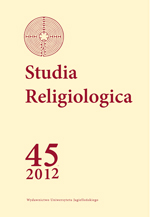Georg Simmel's Concept of Religion and Religiosity
Georg Simmel's Concept of Religion and Religiosity
Author(s): Dominika MotakSubject(s): Christian Theology and Religion
Published by: Wydawnictwo Uniwersytetu Jagiellońskiego
Keywords: Georg Simmel; religion; religiosity; classical theory of religion; genetic explanation of religion
Summary/Abstract: Religion was a recurrent theme in Georg Simmel’s thought. Despite this fact, and despite the current rediscovery of Simmel’s ideas, his insights into religion remain relatively neglected. The task of integrating Simmel’s legacy into the current study of religion remains a continuing challenge. This paper, based on an on-going study of Simmel’s work (involving a close reading of his writings in the original version), reflects on his conceptualisation of the relationship between religion understood as an objective, social and historical phenomenon and subjective religiosity. In Simmel’s view, the religious perspective – a “particular spiritual quality” or “attitude of the soul”, a way of looking at the world as a whole – constitutes a kind of pre-stage of religion. This particular perspective of a religion-like (religioid) character makes up an individual foundation for religion, but it can also express itself in other cultural pursuits, like science or art. It only becomes religion after it assumes a specific form in human interaction. Simmel claims that many human relations have a religious character; faith, which is regarded as the substance of religion, is first a relationship between individuals. Out of the subjective faith-process there develops an object for that faith: the idea of God, who is “the absolute object of human faith”. For Simmel, the idea of God (conceived of as the unity of existence, the coincidentia oppositorum) is constitutive for religion.
Journal: Studia Religiologica. Zeszyty Naukowe Uniwersytetu Jagiellońskiego
- Issue Year: 45/2012
- Issue No: 2
- Page Range: 109-115
- Page Count: 7
- Language: English

